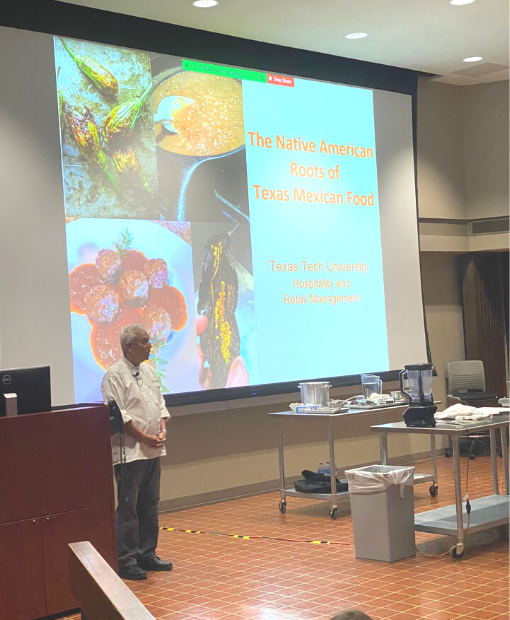
Jessica Yuan works with Celebrity Chef Adán Medrano on gastronomy research and San Antonio culinary heritage
Jessica Yuan, Ph.D., is a professor and Ph.D. program director for the Hospitality and Retail Management (HRM) department. Yuan's research focuses on gastronomy, which includes the study of the intangible cultural heritage, encompassing a community's intellectual, emotional, and spiritual features. Through a partnership with the College of Human Sciences Research Office, this research has allowed her to connect with professionals to explore cultural identity through the Come N Go grant.
The Come N Go grant marks a collaboration between the Texas Tech University Global Understanding of Experiential and Sustainable Tourism (GUEST) Center and Chef Adán Medrano. Medrano is a food writer and filmmaker with deep family roots in Mexico and Texas as a Native American, born in San Antonio, Texas. Medrano is the author of two history cookbooks that are academically peer-reviewed, Truly Texas Mexican: A Native Culinary Heritage in Recipes and Don't Count the Tortillas: The Art of Texas Mexican Cooking.
"Medrano's career has focused on exploring the culinary traditions of the Mexican American community of Texas in its history, recipes, and the significance of the cuisine towards a better understanding of its cultural identity," Yuan said.
As part of beginning stages of the Come N Go grant, Medrano traveled to Texas Tech for a lecture and cooking demonstration for College of Human Sciences faculty, staff and students to celebrate National Hispanic Heritage month. The Hospitality and Retail Management department also hosted a dinner at Skyviews Restaurant featuring Medrano's signature dishes and a screening of his award-winning documentary, Truly Texas Mexican. During his lecture, Medrano discussed The Native American Roots of Texas Mexican Food, which is an overview of the history of Texas Mexican food, the ingredients and culinary traditions and its relation to other regions of Mexican gastronomy.
"The synergy of cultural travel, heritage, gastronomy, and culinary inheritance has the enormous potential for promoting distinct regional identity and fostering sustainable tourism development," Yuan said. "This particular research intends to explore the question: How can local gastronomic heritage be utilized to assist destinations looking to develop a sustainable domestic tourism industry?"
Specifically, the research chooses San Antonio, Texas, as a Creative City of Gastronomy by the UNESCO Creative Cities Network (UCCN). A Creative City, according to UCCN, has recognized creativity as an element in sustainable development. Yuan's research intends to explore the social, cultural, and economic benefits cultivated by the Creative City of Gastronomy status as well as possible negative effects, such as over-tourism, on the communities.
The project will be one of the first research studies that explore the association between local gastronomic heritage, regional identity, and sustainable cultural tourism development for local communities. Yuan and other researchers implemented their theories and practical knowledge through collaboration between scholars and practitioners. Yuan built a solid understanding from conversations with Medrano and a summit hosted in San Antonio.
"Through this preliminary visit to San Antonio, I developed a better understanding of the history of the city and its culinary heritage," Yuan said. "Meanwhile, I was able to identify an initial pool of participants to participate in the in-depth interviews. I am getting ready for the 'Go Stage' of this grant."
The final stage in the Come N Go grant includes graduate students enrolled in RHIM 6350 Advanced Travel and Tourism traveling to San Antonio, Texas, during the 2023 spring vacation period. Medrano will facilitate the data collection by developing a list of local gastronomic venues and food businesses for students to study the city and its culinary heritage. In-depth interviews will be collected with local businesses and government officials to record their experiences with and perceptions of the link between culinary heritage, identity, and sustainability in regional cultural tourism development.
